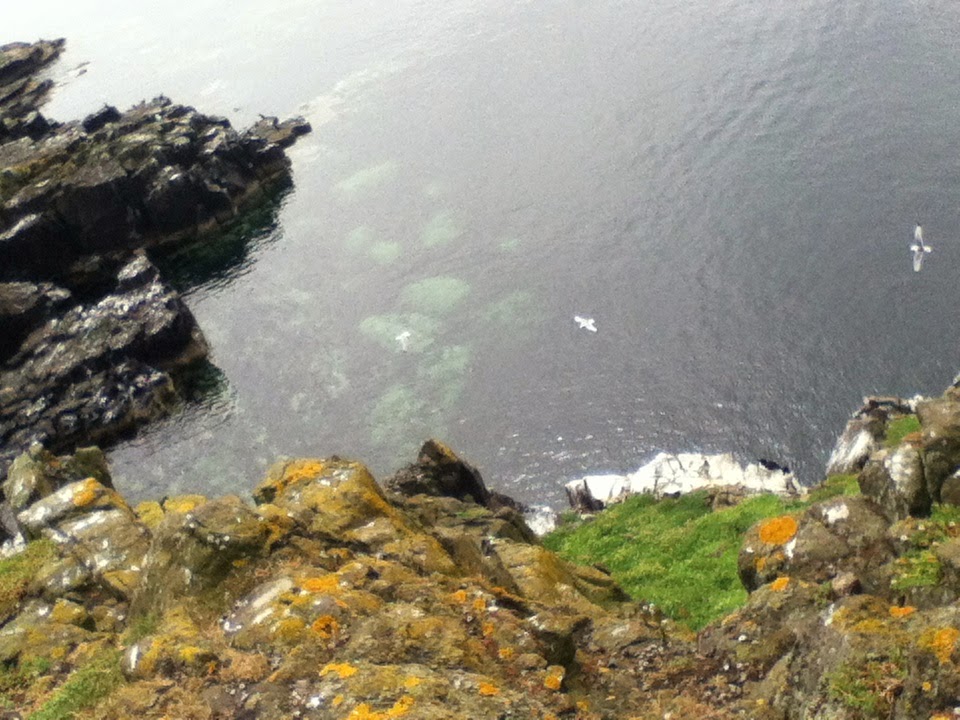almost six months ago, my attention was drawn to all the conflict in Palestine more than it ever had been before. a house down the road from us began flying an Israeli flag all of a sudden. half of all the social media posts are still imploring everyone to speak up, to choose a side or else by default choose complicit cowardice. the news of October 7 and all the terrible news since has been rightly hard to ignore.
since December, my old land acknowledgements post from the summer of 2020 has been oddly popular. the basic stats in blogger tell me it's gotten more than 100 views within the last 30 days. by comparison, a typical post here in this random collection of internet musings gets fewer than 20 views and that's it. but this old post has consistently seen around 30 hits per week for several weeks now-- I'm still not sure why. is it because phrases like "colonial ruin" "violent displacement" and "racist horribleness" are highly topical these past months? I've let my proper Google analytics account languish without updates for too long, so I don't really have a way to find out.
also about six months ago, I was reading Barbara Kingsolver's Prodigal Summer. a lush and lovely novel--a braid of stories all about our relationships with land, trees, animals, nature, and each other. biology. ecosystems. extinction or conservation, and all our efforts inbetween.
there is plenty I've so far remembered about this novel, but the thing I've most wanted to blog about here is a pair of sentences in the middle of it. they are sentences about Jewishness and prejudice and history.
Lusa, one of the three point-of-view protagonist characters in this story, is half Polish, half Arab. she marries blissfully into a struggling-but-resourceful family of appalachian tabacco farmers, too soon loses her husband, inherits his parents' old farm house, and faces various tensions and pressures from her local, white, rural in-laws as a result.
I keep thinking about this line of dialogue from one of Lusa's chapters. she's talking earnestly with the one in-law, a nephew, she feels closest to.
"That's what I was thinking, too. Families lose their land for a million reasons. My dad's parents had this wonderful farm in Poland, which they lost for being Jewish. And my mother's people got run off their land for not being Jewish. Go figure."
this pair of contradictions struck me, as I read it for the first time in fall of 2023, so much more definitively and potently than it might have at any other time.
and when did Kingsolver write this? my idle curiosity is easily answered: Prodigal Summer was published almost a quarter-century ago. in October, 2000.
from devouring her other early novels (Pigs in Heaven, Flight Behavior, Unsheltered), I know Kingsolver has a deft way (sometimes subtle, sometimes less so) of commenting on potentially controversial political realities-- like this seemingly endless conflict in the middle east, or like the relative failings of public education, or like the impact of settler colonialism on indigeneous families, or like the nonsensical state of US healthcare systems.
in October of 2000, I was an almost-17-year-old. what on earth did the words "Israel" or "Palestine" mean to me then? the first I only knew from a bunch of biblical prophecies and hymns, the second from Laurie R. King's A Letter of Mary (1997) and O, Jerusalem (1999), if indeed I'd really heard of Palestine at all. in neither context did I think very critically about what these stories meant. honestly, I was probably quite detached from both versions of the place. their respective peoples. they all may as well have been equally, ineffably, untouchably fictional.
halfway between then and now, I must have seen this rather haunting animation make the rounds on the internet. you've probably seen it, too.
unsurprisingly, there are dozens of new comments on that page since the events of last October.
looking into the piece again this past week, I realized that a full-length film version was produced and likewise donated to the public domain in 2018. do I have the time and spiritual energy to watch it? hopefully someday. (I've also now realized that the artist, as generous as she has been with her artwork, seems to have some not so cool opinions about the social construct of gender, so there is that to grapple with too.)
being Jewish.
not being Jewish.
we might say Lusa's ficitonal comments here are oversimplifying things.
and yes, I'm usually the first to say (to myself if nowhere else) there must be more to it there's so much we don't know how can anyone have a truly worthwhile opinion what's the use in trying to fully understand it anyway it's so complicated and what can I do about it or about anything, little me with my little blog and my little comfortable life?what's truly oversimplified is any inkling of a thought that this single roundabout post regarding my country's rather terrible, rather unconscionable involvement in the horrors of this geopolitical situation is anything like enough to counter my general day-to-day silence on the topic.
no matter how many times I might ponder bringing it up to my students or asking all the ROTC cadets how they feel about Aaron Bushnell or posting something to instagram with a hashtag like #CeasefireNow or #GazaWillBeFree... thinking about a few lines from an old Barbara Kingsolver novel and mentally wringing my hands about all the knotted historical roots of this conflict aren't enough at all.
I don't know what could be enough. write to congress? to the president? just once? or every month? every weekend? with a few pleading letters or phone calls to these more-powerful-than-me people, can I then say I've done my part?
I don't know. it doesn't seem like it. no number of letters or public protests, and certainly no ocean of hashtags, no matter how many, seems like enough.
so for now, current events continue to sweep across the world, sort of but not really dragging me with them. even so, we are all connected. we are all somehow jointly creating this world. the fact that I'll never be able to single-handedly fix anything on the other side of the planet doesn't mean I can safely give up, right? even if I don't-- or can't-- truly know if my impact on the sprawling web of the universe is leading to more preservation and less extinction of light and goodness, I have to keep trying.
is it up to me to decide which side of the scale my feet are on? to judge my own quotas of light vs. dark?
for now, it is. I'm the only one who can. am I doing my best?

























